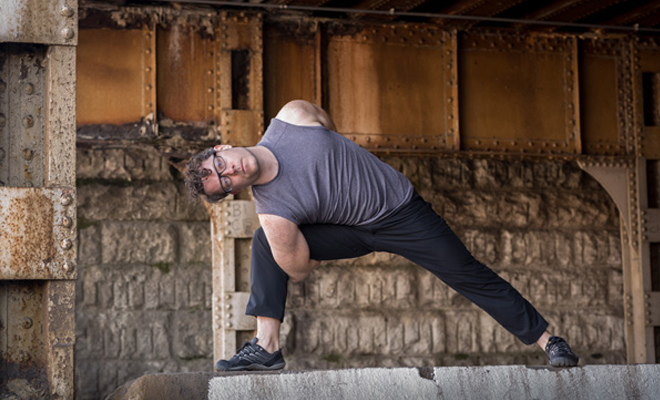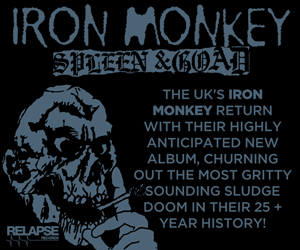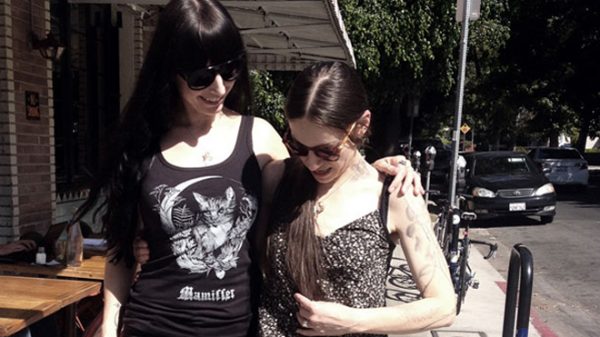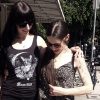In the second chapter of my double interviews series, I chose to have a chat with André Foisy (Locrian, Kwaidan, Eolomea, Khamsin) and Brittany McConnell (Wolvserpent, Mezektet). As many of you probably know, they’re both yoga teachers and they’re currently in Relapse Records roster with two of their projects, Locrian and Wolvserpent. Their music is dark and ritual, kaleidoscopic but comprehensive, and holds a sense of modernity where metal, kraut and ambient drone are a black lake from which you’ll come up spiritually renewed. They’ll be talking about: Black Metal yoga, buddhist monks chants, Roadburn, Popol Vuh, Turbodog yoga, corpse pose, drone bath, Super Moons, Relapse Records, Swiss rabbits, Anusara yoga, Boise people, Cahokia and much more.
Hi Brittany, hi André. You already know each other since you met in Chicago some years ago at a Wolvserpent gig, have you some memories of that night?
Brittany: Hi Francesca and André. Yes, I do remember that gig. It was the first time Wolvserpent played Chicago. I thought it was a great show, reminiscent of noise shows we’d played in the past where people were stoked on the music. It was intimate and the listeners were engaged. André and Locrian were quite hospitable. We went out for some delicious mediterranean food before the show and André put us up in his apartment for the night. We talked a bit of music, played with his awesome dog, and got some rest.
André: Sure, that’s when I met Brittany. I set the show up at a place called Enemy, in Wicker Park. It’s on the 3rd floor and there isn’t an elevator. I remember thinking how happy I was that I didn’t have to bring much gear up the stairs. I was watching Wolvserpent load equipment and I kept thinking about: 1) how cool it sounds to play with tons of amps; and 2) how much it must suck to have to load so many amps at every show.
Wolvserpent’s set was awesome. It was really nice to see them in such an intimate environment.
Brittany, you and André are both yoga teachers and sometimes you arrange special lessons, like that of some weeks ago on the mountains with your students. Can you tell us more about that experience?
Brittany: Yes, it was a trip hosted by the local University. A two night trip for people of all levels of backpacking and yoga experience. I was along to teach a couple yoga sessions each day. It was a challenge to quickly get to know the group, their needs and what they wanted to get out of a weekend of yoga in the mountains. I love teaching that way. I have to be very present to what is arising in the group. We went to South-Central Idaho to an area that had a big forest fire about ten years ago. So the setting was pristine with clean air, mountain views, rivers and streams and also huge crag trees that were still partly black from the fire. They loomed all around us swaying and creaking and threatening to fall.
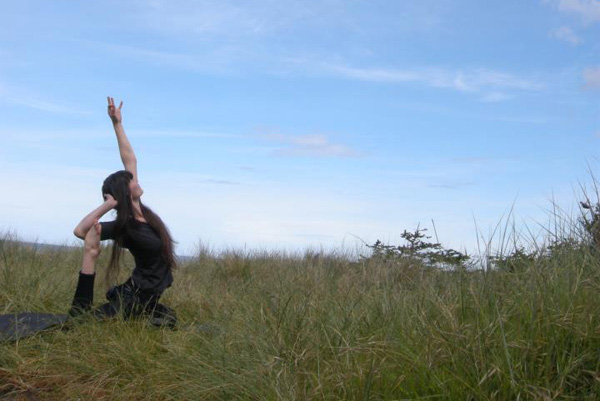
André, you recently went on a European tour with Locrian and you made some solo shows and a special Yoga lesson: a Black Metal Yoga Candle Night in Berlin. How did it go?
André: The yoga session was really fun. I did it at a place at Tatwerk and they were really supportive of the idea. It was amazing. I hope to go back to Berlin soon to do more yoga workshops.
Also, I feel like teaching a yoga workshop gave me a chance to really connect with the people who were there in a totally sober and intimate environment. I gave the class a drone bath at the end and that’s really the perfect way to experience the stuff that I play.
This drone bath thing has become quite famous in the last weeks. Can you tell us more? How do people respond to that?
André: At the end of yoga classes, students lay on their backs and rest and breath deeply using Ujjayi breath. This pose is called “corpse pose”.
I thought that it would be a great experience to listen to drone music while resting in corpse pose. Personally, I’d rather listen to drone music in this manner rather than in a bar around chatty drunk people.
The drone bath feels great and I have no question that it’s also very healing to the body as well. Humans are mostly made up of water and sound travels more rapidly through water than through solid materials. Laying on your back and feeling drones sounds great, it enables people to really feel the music, and it’s entirely relaxing. Time become an illusion when things go right.
For the musicians, it’s nice to play to an audience that’s giving you their whole attention. It’s really the perfect audience.
People have told me that after the drone bath they’ve felt lighter and that they lose track of time entirely. They’ve asked like “how long did we rest in corpse pose?”
Typically, the drone bath lasts for about 15 minutes, but there are no rules.
During the last drone bath, my group Kwaidan performed and our drummer (Mike Weis) was able to walk throughout the audience playing his drums.
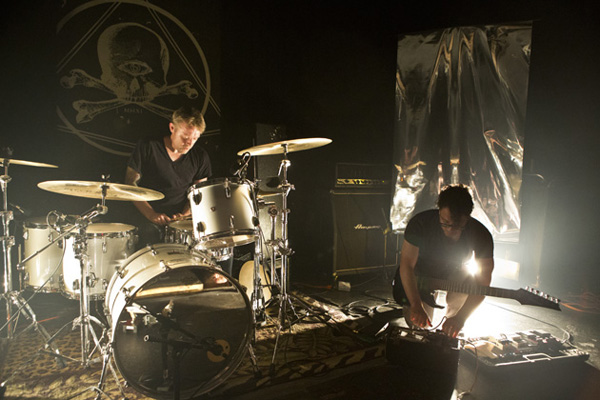
Brittany, your lessons are inspired by Anusara Yoga, which is a form of Yoga that introduced a more health-oriented Western approach. Do you have developed a personal interpretation of it through the years?
Brittany: It’s true, I have done my training in Anusara Yoga, and I am quite inspired by that method. I am, however, no longer certified in this method. I moved away from the organization last year. I continue to teach with the elements of an Anusara Yoga class that I found to be most useful: intelligent alignment, connection to the lineage of the practice, and an emphasis on “good company” in community.
Anusara can mean “flowing with grace”, “flowing with nature” and “following your heart”, and the “heart attitude” like the “alignment” of different parts of the body play an important role in it. How do you think this has helped you as a musician and as a creative person in general?
Brittany: This aspect of Yoga practice has helped me very much in many areas of my life. On a very practical level, I came to yoga with a back injury. I had been working on a farm and doing a lot of gardening work as a teenager. I injured myself and a friend suggested I try yoga. It was surprising how quickly I started feeling better, stronger, and less fragile after each session. The practice was also working on my state of mind and emotions. I found that my rebellious tendency to harden to any enjoyment of life was softening. I started to connect to a creative force in myself again.
These effects of the practice continue to work on me. It requires that I listen and attune to a more subtle aspect of experience. By aligning my body more optimally to function as a finely tuned instrument, I can play music for longer stretches without fatigue or injury. I am also more connected to my desire to play music. It is a way for me to be in service. It is one form of bringing forth beauty and truth. For me, that can look like the attentive focus of holding a pose on a yoga mat or like listening intently for just the right placement of the next hit in a riff. It becomes the same practice in different forms.
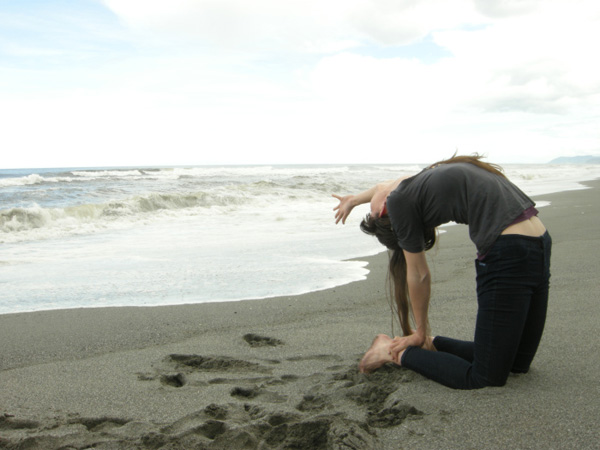
André, in some interviews you have talked about the benefits of Turbodog Yoga for musicians, especially during tour dates. Can you explain how this kind of training can positively affect a musician’s life?
André: Sure! There’s a ton of ways that this yoga is good for musicians.
People who practice this yoga feel better so they play music better and with less pain.
For me, I get wrist pain, back pain, and sometimes neck pain. Playing music and touring exacerbates these issues.
Turbodog yoga incorporates a modern understanding of the body in order to help people’s bodies open up really quickly.
It’s also really helpful at helping people to tap into their creativity because it opens up the channels in the body so effectively.
I’ll be posting about yoga on the Deciblog and on my own blog more in the near future about how yoga can help musicians.
André, Turbodog Yoga, just like any other yoga practice, has its own traits and it deals more with the physical dimension of training rather than with the spiritual one. Other practices, like Anusara Yoga have a health oriented perspective too but they focus on the spiritual side. What do you think are the main differences between these two kind of Yoga practices?
André: Anusara yoga is really focused on helping people open up their hearts, which I think is great, but Turbodog yoga also works to help people open up their hearts as well, but in a really down-to-earth way.
I don’t know much about the Anusara meditation practices so I can’t accurately compare them to the Turbodog mediations.
The physical postures in the yoga that I practice are a bit different than in other styles. For instance, people keep a relaxed neck when they are in poses. Most modern people have stiff necks and neck tension.
Keeping a stiff neck while practicing the physical postures probably wasn’t a big deal for ancient Indian yogis, people who didn’t stare at computers or drive cars frequently.
The style of yoga I teach also incorporates active stretching to help the body open up. When you activate a muscle and stretch it at the same time, then the muscle has the strength to support the body’s flexibility.
We also focus on antagonist muscle relationships. For instance, when most people try to stretch their hamstrings, they frequently passively try to touch their toes with their legs straight. In reality, the quickest way to open up the hamstrings is to not stretch the hamstrings, but to strengthen the weak quads. So, we use a lot of sneaky tricks to open up the body quickly.
Brittany, I know usually there’s a musical part at the end of a Yoga lesson, isn’t it? What kind of music do you prefer to accompanying it?
Brittany: I’m not sure if there is any “usual” for Yoga classes these days. They seem to come in any form – music, no music, fast, slow, hard abs, relax tension, wine after class, no wine because we abstain, and on and on enough to make your head swim – HA!
But, I think you are referring to the end when there is time for relaxation. I generally do not use music in class and ask that people listen to their breath in order to become more present and aware of their experience. But I do sometimes bring my viola and play something soothing for everyone in savasana, “corpse pose”.
André, you usually use “unconventional” music in the last part of your Yoga lessons and you released some podcasts of your playlists. I know you put on stuff like Nadja, Popol Vuh and even Black Metal. How is this podcast thing evolving through time?
André: It’s challenging to put a playlist together that works with the class sequence and the class theme, but it’s fun to go through my music catalog to try to find things that will fit well.
If anyone has suggestions for tracks to include on my yoga playlist then I’d love to hear them.
Brittany, what about you? Have you ever made a podcast for your students?
Brittany: I don’t typically use music for class… unless I do. HA
At home, occasionally I will put on some music to practice – especially if I’m feeling sluggish or uninspired to do the physical practice. If I do want music, I might put on Yob, Black Boned Angel, Elemental Chrysalis, Ash Ra Temple, A Story of Rats, Natur (Stevie Floyd), Buddhist Monks Chanting, Asva, Chelsea Wolfe, or whatever grabs me :). I have also been working on a collaboration with Blake for a “Heavy Yoga” offering for a long time now. This will be an experiential yoga class with heavy drone accompaniment played live in the venue.
André, you have studied Anthropology for several years. What’s your connection with symbols and spirituality in your Yoga practice and more in general in your music and in your life?
André: Symbols can be anywhere, it’s a matter of recognizing them. Yoga has really helped me to feel more in the moment, which has made me more attuned to noticing things that may hold some symbolic meaning to me.
I view my life as a spiritual journey and the body and the spirit are closely linked. Yoga has helped me to feel better in my body, which has helped me to get more in touch with my spirit.
Playing music is a spiritual journey for me because what I play comes directly from the spirit.
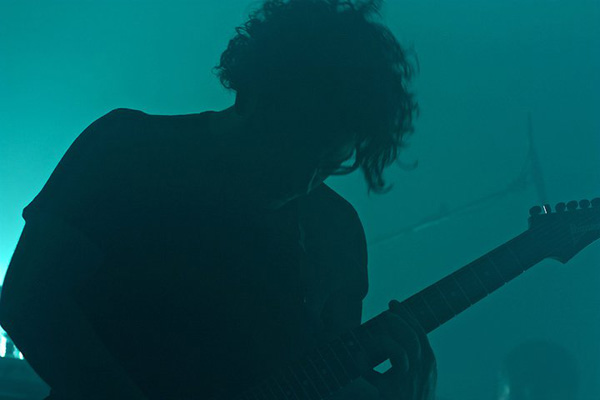
André, talking about music, it seems like there has been a great feedback from people who attended your gig at Roadburn. How does it feel to play at a festival like Roadburn? Have you some anecdotes about that?
André: Roadburn was so fun and there’s no festival that I’ve been to that’s like it.
It was a huge honor to be able to open the festival and to play at the best venue at Roadburn, Het Patronaat, which is an interesting church.
Our set was really loud. I had to tape my pedals to the floor and I also had to tape my speaker cables to the back of the amplifiers so that they didn’t come loose.
The other nice thing about playing early was that people didn’t have time to drink much beer before out set. All of the venues later in the day smelled like beer farts. Roadburn should invite more bands over who burn candles next year.
I was really impressed by the Corrections House set.
Can you tell us more about the dog who looked at the bunny in the pet store? (It’s about a photo André posted on Facebook some time ago).
André: Ha! Yes! The bunny in the window was in Bern Switzerland. I was there right around Easter and there’s a shop window there that placed bunnies in the window for the holiday. Some of the bunnies were sleeping in their food dishes. I noticed the neighborhood dogs surrounding the windows of the store. They probably wanted a snack. It looked like the bunnies were sleeping in dog dishes and the dogs were hungry and… confused.
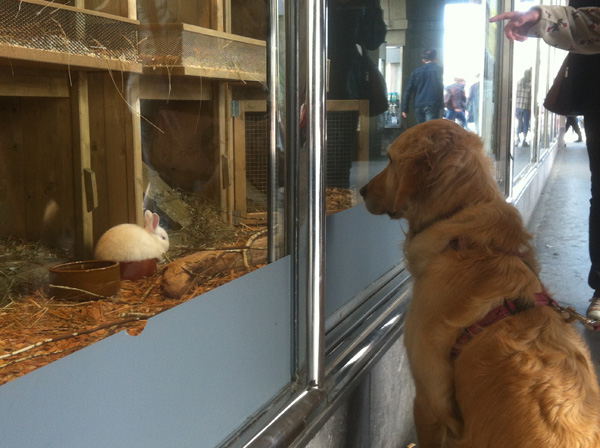
Brittany, I know you came on a European tour in 2011, have you some memory about that time? Are Wolvserpent planning a new tour here in Europe?
Brittany: Yes, I remember that tour quite well and fondly. It was the first time we toured Europe due to the generous offer of Aaron and Nathan, of Wolves In The Throne Room, to come along as opening support. It was an incredible experience. We were really spoiled with good shows, good food, good people, and an amazing taste of music culture in other parts of the world. We also worked really hard, as is required of any tour. We learned so much from playing on bigger stages (and small stages), and how to be a good support band, how to take the good with the bad (many audiences received us well but that can’t always be the case), and how to work really hard…. well, even harder. We came home with a whole list of ways to improve what we were already doing – both musically and in our operation as a group.
It was also quite great to experience a little bit of the different cultures across Europe. The way people take in, a musical experience can vary a lot depending on the people. And it is also the same. There is something universal in being present to the moment, the music and your own personal response. As in the United States, we met some people and it felt like we’d known them for forever – kindred spirits.
You and Blake have played for almost a year together, making long rehearsals and finding a way to build the sound of Blood Seed, which showed an evolution in the use of sharped and powerful riffs, fine-tuned crescendos and a more opened sound. With Perigaea Antahkarana it seems like the tracks have become a kind of suites and that the album is in general more various: it integrates ambient drones and soundtrack atmospheres, heavy and black metal, noisy suggestions and even krautrock echoes. So, what are the main influences that guided you from Blood Seed to Perigea Antahkarana? How’s been the recording process this time? Do you and Blake still meditate together sometimes during the recording sessions?
Brittany: I like that description of the Perigaea Antahkarana tracks as “suites”, it works well. The pieces are self-contained and can be experienced on their own. But, when put together, they are meant to lead one through a whole landscape of varied terrain as a cohesive and continuous musical encounter. Separate and interdependent musical expressions.
Influences for me are hard to pin down. Blake and I listen to all kinds of music and I think it all influences what we do. For me, I listen to what I am enjoying in the moment until I’m not any more… it’s no longer “alive” for me, and I move on. I don’t usually consciously put those influences into our music (although, Blood Seed was heavily influenced by violist/composer Eyvind Kang).
We were influenced by our consideration of how we want to live our lives, what role music plays in our lives – what it’s purpose is (if any), contemplations of our relationship as species and cultures with Earth, ways in which we can live our lives in alignment with our values, and what are our values? Whew, that’s all!
The recording process was great. We were fortunate to work with an immensely skilled engineer and good friend, Mell Dettmer of Soli Studios in Seattle. We tracked some of the material at our home studio.
Blake and I both have practices, but we do not always do them formally together. Often, he will be taking care of some logistics or tracking something out and I will get a chance to steal away for a bit of practice and vice versa.
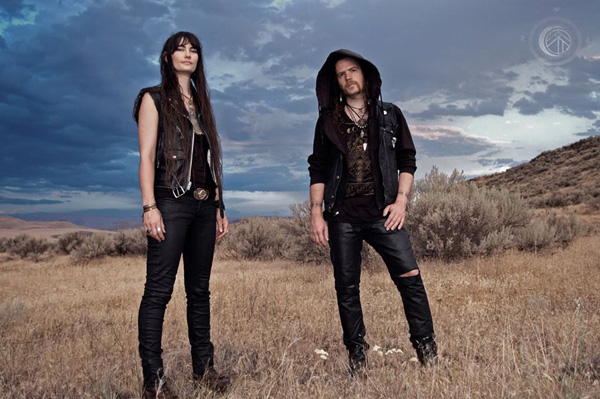
André, Locrian’s story begins with you and Terence discussing the general ideas around which the project has grown. Starting from the skinny and open sounds of “Drenched Lands”, passing through the shimmering doom soundtracks of “The Crystal World” up to a kaleidoscopic album like “Return to Annihilation”. What’s the secret for maintaining your own style while including sparse influences, transfiguring them in your vivid and decaying dreams?
André: We’re trying to make music that moves us and we’re less interested into fitting into any category. There’s something really stifling and boring about categorizing music and we are more interested in exploring themes, ideas, and feelings.
Playing music is spirit moving through me. What people hear from my recordings and performance is really the object of my spirit. I think that could be said for Terence and Steven too.
André, “Return to Annihilation” is probably your most eclectic album. On the one hand some of your references seem to be more directly uncovered, like they were almost homages to some bands which have been important for you, on the other hand the tracks seem to have a more defined form, a kind of song structure. What about this choice?
André: We wanted the album to be very concise and dynamic, but we also wanted there to be movement. Everything was written very quickly and recorded quickly so what became the album was never overthought in any way. Our music has always been more about feeling than thinking.
About references: I always liked how bands like Genesis would do things like that on their albums. For instance, the theme to “The Lamb Lies Down On Broadway” is on at least two tracks on that album.
Ah! Now I know what that riff which sounded so familiar was. Anyway, in all Locrian albums there are strong marks of your sound and shadows of past works. This time at the end of the album there’s even a quote, the folk guitar in “Obsolete Elegies” which recalls “Obsolete Elegy In Cast Concrete” from “Drenched Lands”. Is there a specific reason for that choice?
André: We used the theme from Obsolete Elegies off of “Drenched Lands” on the new album because it’s really bring back motifs from older releases in new ways.
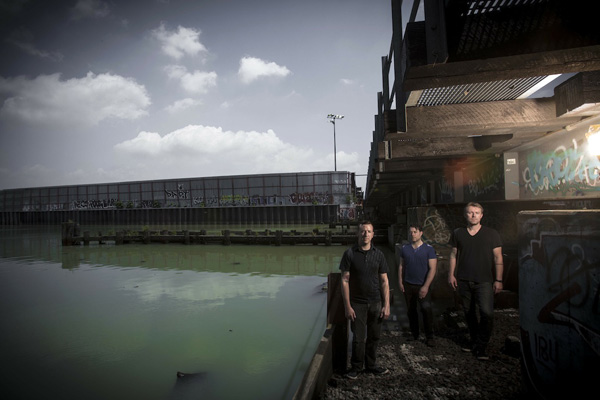
Brittany, your live sets have become definitely powerful through the years, and more similar to outgoing mantras. What’s your secret?
Brittany: Thank you for that compliment. We have worked really hard to make our live performance a powerful experience.
I think one of the most important things I can do to cultivate strong and clear communication is to Listen. This sounds overly simplistic but, I mean whole-being listening. Full body/mind/heart listening is a big task. It requires our full attention. This fullness of attention is under constant bombardment by the many distractions of our modern lives – the email inbox, the dirty dishes in the sink, the rehearsal you need to get in this week, the bills to pay, the job to work, etc. So, practices that recover Attention are most valuable to me for creating powerful performances or even the ability to be present with my family and friends.
Antahkarana is an ancient Tibetan symbol of meditation and healing. Can you tell us more about this choice for the album title?
Brittany: Antahkarana, to me, signifies the vibratory spectrum of existence. That we don’t exist purely in a realm of intellect or matter, one or the other. That substance isn’t even substance but rather a soup of energy sliding from seemingly solid “thingness” to less obvious forms of expression like our mind. This term and idea comes from ancient teachings of India and Tibet and is also supported by the work of physicists in the scientific community.
Perigaea is actually a word that we made up. While we were recording the album there was a “Super Moon” – a phenomenon where the moon comes especially close to the Earth due to it’s elliptical pattern of orbit. The term for this is perigee. This particular “Super Moon” brought the moon closer to the Earth than it had been in over 20 years. I found this to be auspicious. I liked the metaphor of our illuminating intellect (the light reflected by the moon) coming close to the Earth, home. So we put together the terms “perigee” and “Gaea”, the Greek goddess of Earth.
For me, the joining of these terms is an invocation for my intellect to become steadily grounded in all aspects of my being (flesh, bone, muscle, blood, breath, pulse, heart and mind). It’s a call to yoke my intellect to the upliftment of life here on earth. A call to ecology.
Brittany, you live in Boise, Idaho. What about your relationship with that place? I guess Uzala are from Boise too. Is a small “scene” growing there at the moment?
Brittany: I have lived in Boise, Idaho for all my life. It is an interesting place. It’s not always interesting on the surface, but that’s part of what makes it interesting. To me, it is just like the surrounding desert landscape. If you look out from afar, the desert here looks like a brown expanse of nothing… well, sagebrush and sparse tufts of grass. But, if you get close, down into the landscape, you can begin to recognize a whole intricate ecosystem, right there under your nose.
Chad and Darcy of Uzala are from Boise as well. Chuck, the drummer for Uzala, lives in Portland, OR. I think there is a sort of “non-scene” happening in Boise. What I mean is, there are music-lovers who are willing to go between different scenes. At our shows in Boise you won’t find only metal-heads. There is a great diversity of people from metal-heads to moms – not that those are exclusive- HA! There is a lot of support for music of all kinds due to some very diligent show-promoters and club-owners, like Eric Gilbert and Samuel Stimpert, to name a couple. Plus, I see musicians and bands supporting one another even when they are creating drastically different music. I love that.
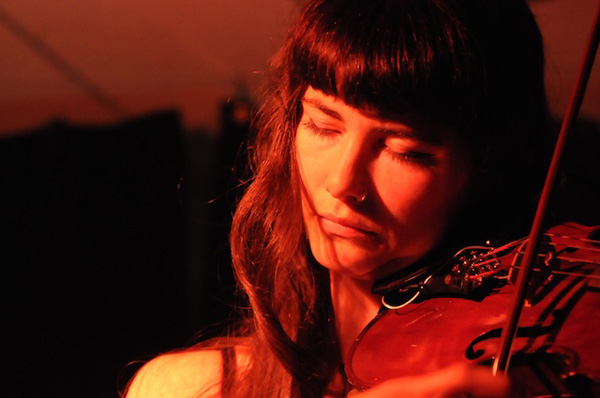
André, you and Steven Hess live in Chicago and Terence Hannum has lived there for a long time. You have talked about how your music reflects urban decaying landscapes. Are there specific places around Chicago which inspired you over the years?
André: Sure, in Illinois, one of my favorite places is Cahokia, which is an ancient pre-European city. It was abandoned before Europeans got here. Most scholars believe that the people who inhabited the city exploited their environment and weren’t able to stay in the area because they ran out of resources.
There are plenty of places like this throughout the world, but places like that are inspiring because it’s a reminder that the environment is us. We all may end up like Cahokia.
Chicago has much less urban decay than you’d think though. If you were to visit a place like Detroit, then you’d see some urban decay. There are parts of Detroit where nature is just taking back the city. It’s really interesting.
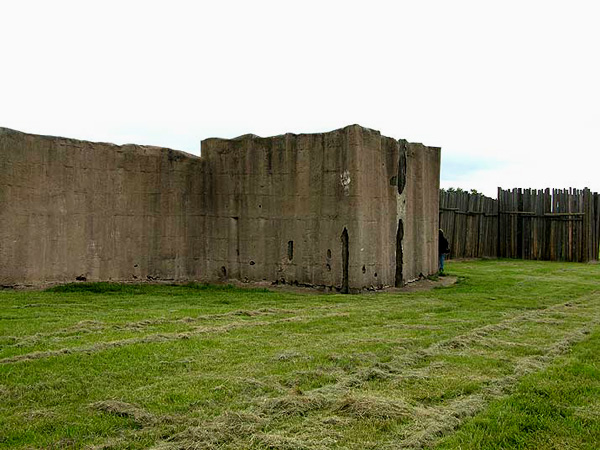
I know that story cause here in Italy newspapers gave a lot of space to the Fiat-Chrysler romance. Apart from this, both Wolvserpent and Locrian signed for Relapse Records some time ago. How have things changed since then? What do you think about Locrian and other bands which are driving heavy sounds to explore new territories? Are there some bands or labels you appreciate around you?
Brittany: Things have been great since signing to Relapse. They have been great to work with and it’s so nice to see them taking on music like Wolvserpent and Locrian that are exploring new territories. I really appreciate Locrian and bands that are doing something different and honest. I enjoy the tracks like “Exiting the Hall of Vapor and Light” that are intelligent and creative forces unto themselves – no need for formula or pretense.
There are a lot of really great folks in Boise working hard in bands. A lot of them are nothing like what we are doing… and I like that. A few bands are Hillfolk Noir, Gem State, Clarke and the Himselves, Gorcias (self-dubbed “creepabilly”), Uzala, and Grandma Kelsey.
André: Relapse is an amazing label. Everyone that’s involved with the label are great to work with. They are really supportive of what we do.
We started working with Relapse a couple years ago. It was actually the same time that Terence moved to Baltimore. Since then, we’ve been able to play together less, but it’s nice in a way since it makes playing together more special in a way.
I think it’s great that bands are doing different things within the context of heavy music.
There are a ton of bands that play heavy music that are doing amazing stuff though.
I live in Bridgeport and there’s a band in my neighborhood called Sun Splitter. They are awesome and probably the most underrated band that I know of in Chicago.
There’s an awesome project from Pittsburgh called Requiem that’s great. I’ve got an advanced copy of the upcoming Gog album and it’s amazing.
I just played with the Haxan Cloak and I love his stuff.
I’m always checking out whatever records that Relapse releases. There are some labels like Tri Angle that I’m digging as well.
Brittany, you and Blake have another couple of projects: Aelter and Mezektet. Aelter sounds like something quieter than Wolvserpent, with oniric atmospheres in which Blake’s guitar layers seem to prevail. Can you tell me more about this project? And what about Mezektet? I know you and Blake, together with Garek Druss (A History Of Rats) have recorded two long tracks between 2008 and 2009 and put them on a unique limited cassette. I’ve been really surprised and I enjoyed this aspect of your music among black metal and industrial sounds. Is there a future for this project?
Brittany: I’m glad you enjoyed these projects. Aelter is Blake’s solo project, although, I was part of the band for the only live performance to date.
Mezektet is a joint project between Blake, Garek, of A Story of Rats, and myself. We do have future plans for Mezektet. We live in different cities and since we have decided to record only when we are on location this can be rather difficult. It is just a matter of fruition.
André, besides Locrian you have other projects, including Kwaidan, together with Mike Weis and Neil Jendon (Zelienople). Is there a link between Kwaidan’s ritual and nostalgic guitars and Locrian’s industrial drifts?
André: There are some similarities in my guitar playing with Kwaidan and Locrian, but generally I’m much more minimal with my playing in Kwaidan. Kwaidan is almost entirely improvised and spacious and Locrian tends to be more oppressive and aggressive.
André, your fascination for krautrock sounds and atmospheres is recurrent in Locrian and preeminent in Kwaidan. How did it start this amazing “relationship”? What’s your favorite Popol Vuh album?
André: One of my brothers got me interested in prog-rock and that led me to krautrock. I’ve always liked that Krautrock sort of lets you feel things rather than forcing the listener to feel anything.
My favorite Popol Vuh album lately is Agape Agape. There’s just an amazing guitar work on that one and I love the chanting on the album.
André, Kwaidan is a great movie accompanied by a stunning soundtrack by Toru Takemitsu. Listening to it we can easily find some similarity with Mike Weis’ drums and percussion. What’s your connection with that movie?
André: The film is all about slow build-ups and Kwaidan’s music started out that way too. We recently played at a cinema to a silent film called “Le Tempestaire” and that was a really fun performance since it really challenged us to play in a way that complimented the feelings in the film. I hope that we get other opportunities to do similar things.
OUTTAKES | ANDRÉ VS BRITTANY:
André: Brittany, what’s one thing that you do while you’re on tour to feel your best?
Brittany: I love that question… If I have to pick just one thing, it is my meditation practice. At one time it was really difficult to meditate – I would feel agitated, annoyed, anxious or bored. But, with practice and great instruction from my teacher, it’s now one of the sweetest parts of my practice. I sit twice a day for meditation. I try to practice before the day begins and then also sit before performing, when on tour. Because it is such a constant in my life, it is very grounding, calming and invigorating for me to continue this practice on the road. No matter where I am I can sit, close my eyes, and connect to something that is deeper than the surface-level of my day-to-day experience; I can connect to something beyond words, very much like playing music. It can feel like tapping into a vast source of energy and getting recharged.
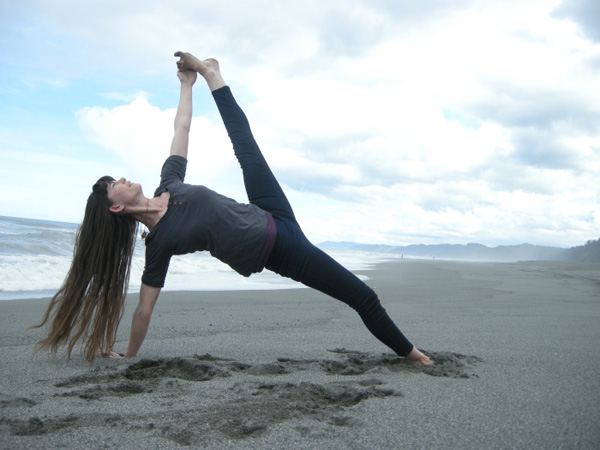
Brittany: Now I have to know, what do you do on the road to feel your best?
André: I’m always looking for new ways to feel good on tour.
I tend to get bad allergies.
On my last few tours, I’ve brought my neti-pot with me. A neti-pot is a little pot that you fill with distilled water and a tiny bit of sea salt. Then you let the water run through your nasal passage and blow your nose. Lately, I’ve also been putting a drop of non-alcoholic oregano oil in the water to make the solution more potent.
It really helps my breathing and it’s a tour necessity for me, especially during allergy season.
Brittany: What similarities, if any, do you find between the practice of music and the practice of yoga? Do you ever find the two to be in conflict?
André: For me, playing music and keeping a yoga practice is all about feeling. In yoga, it doesn’t matter what pose someone can or can’t get into. It doesn’t matter if the feet are aligned properly or if things aren’t perfect, but it does matter what someone feel in those pose. When I play music, it doesn’t matter if things are perfect. It’s more important that I feel something that resonates within me, or something authentic.
I have a tendency to be a perfectionist and I struggle against that tendency when I play music or do yoga. Yoga is great for working on issues like perfectionism because you need to let go of control. If I’m controlling in my yoga practice then I tend to get exhausted really quickly and things don’t feel good. My body freezes up. With music, I can’t force myself to be creative, it has to come from inside of me.
Brittany: André, in my experience, the world of yoga and the world of heavy music can be quite different (although they come closer together with offerings like your Black Metal Yoga sessions). Do you ever find that people in one of those realms are surprised to find out about your involvement in the other?
André: I think that a lot of people in both realms of my life are surprised.
People from my yoga community have surprised me by attending my metal yoga events. These yoga people wouldn’t normally listen to the kind of music that I play at these events. These people have really enjoyed the music though and I think it’s because it works with my yoga class. It’s intended to make people feel something and it helps to bring up emotions or feelings.
On the other hand, people that know me from my music community are all over the place in terms of my involvement in yoga. People that know me closely know that I don’t really care about pretending to be someone that I’m not. Like at Roadburn, some people that I didn’t know said that Locrian was the heaviest band that they saw, but also the nerdiest looking band. I took that as a huge compliment.
I’ve really been surprised by the number of people from my music world who have connected with me because of my yoga practice. Some of them practice on their own. Some people have chronic pain that they’d like to get relief from or other issues.
What are you doing at the moment? Any plans for the future?
Brittany: I am teaching yoga classes in Boise. I am also deepening my own study through an Advanced Yoga Teacher Training that spans two-years and 500 hours of study.
I’m rehearsing with Wolvserpent for some festival performances this summer. We play some dates in Fall that are yet to be confirmed. Wolvserpent has plans to tour Europe and we hope to reveal those details soon.
We are also recording a follow-up EP to Perigaea Antahkarana that will be released on Relapse Records hopefully in Fall 2014 or Spring of 2015.
André: Right now, I’m trying to get deeper into my yoga practice and I just recorded a new Locrian album. I’m hoping to finish mixing the album this summer and relax a bit.

